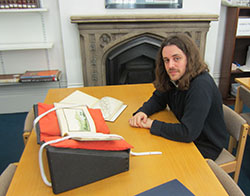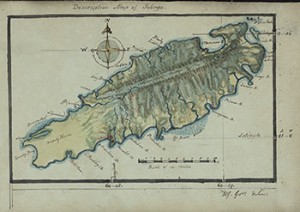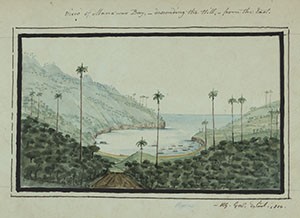This post is made on behalf of James Hatherill. James is undertaking an MA in Modern History at King’s and as part of his course is taking the optional internship module. For this element of the course he is based in the Foyle Special Collections Library where the research project designed for him involved:
- Transcribing a 19th century manuscript report by William Young (1749-1815), Governor of Tobago and MP. The report was a plea to the British government to bring stability and prosperity to the island of Tobago and consolidate British possession of the island. A link to the catalogue record for the item James has been working on is available here: An essay on the commercial and political importance of ye island of Tabago, 1810
- Assisting in the digitisation of the item for display in an online exhibition; and assisting with the online curatorial process
- Researching the context of the report by using the holdings of the Foyle Special Collections Library, (including the historical library collection of the Foreign, Commonwealth and Development Office); and undertaking a trip to the National Archives to discover any evidence of an official response to the report
- Writing an introductory essay and a blog post on the work
The internship runs from January to April 2017 and involves 100 hours of primary research. James writes:
 I have found my time in the Foyle Special Collections a rewarding and intellectually stimulating experience. The subject of my research has given me a new perspective on a part of the world I did not previously know much about, and also an insight into the workings of the British Empire and its presence on the world stage.
I have found my time in the Foyle Special Collections a rewarding and intellectually stimulating experience. The subject of my research has given me a new perspective on a part of the world I did not previously know much about, and also an insight into the workings of the British Empire and its presence on the world stage.
I was able to consult contemporary documents and maps of the area, and even follow up some research at the National Archives. I found the digitisation process interesting and rewarding in the knowledge that the document I was working on would be preserved in a digital format.
Academia, like much of the world, has been completely changed by new technology and the information age. The benefits are quite immediately apparent in the discipline of history: access to primary sources previously made difficult through geographical circumstances can be more easily obtained. Similarly for secondary sources, websites like JSTOR can allow you to search countless articles from any journal relating to any subject which you may be researching. As a result, my studying of history has involved quite a lot of digital interface.
This has perhaps led to my experience at the Foyle Special Collections Library being quite a novel one as I have never worked quite so intimately with 18th and 19th century documents before. There is a larger debate surrounding digital vs. analogue in the background here, but that is for another day.
I am by no means a Luddite and completely enjoy the benefits of this age, but coming here and working in the collections has reminded me of the reason why history can be so encapsulating. To be connected to a person from the past through the paper with which they put their pen to and made a mark. That, along with the pleasure of working with the staff at the collections, has been the most enjoyable aspect of the internship.
An extract of my research into the work is reproduced below.
The development of Tobago
 The island of Tobago has a history of political instability unlike that of any other Caribbean island during the 17th and 18th centuries. Tobago was in a ‘State of Betweenity’ as stated by Eric Williams. This is in reference to the relentless claims of various European powers to their colonial rights to the island, namely France, Britain and the Netherlands. In addition to this, buccaneers and marauders made sailing through this part of the Caribbean at the time a dangerous affair.
The island of Tobago has a history of political instability unlike that of any other Caribbean island during the 17th and 18th centuries. Tobago was in a ‘State of Betweenity’ as stated by Eric Williams. This is in reference to the relentless claims of various European powers to their colonial rights to the island, namely France, Britain and the Netherlands. In addition to this, buccaneers and marauders made sailing through this part of the Caribbean at the time a dangerous affair.
Young’s Report
By the beginning of the 19th century, we have an island which is wrestling with its history and legacy. Sir William Young, 2nd Baronet (1749-1815) became Governor of the island of Tobago in 1807. He began to comprehensively assess the island’s viability as a suitable focus for expansion, an assessment which eventually culminated in this manuscript.
In the transcription I undertook I have not edited the text in any way. I have included any misspellings, punctuation or grammar mistakes which Young may have made. In some cases, these may just have been conventions of the 19th century such as the frequency of Tobago being written ‘Tabago.’
Young’s report to the British colonial government was in essence a plea to try and bring stability and prosperity to the island. He quite rightly points out in his report that instability does not encourage investment. The reputation Tobago had found itself with ultimately meant few merchants were willing to station themselves on the island. Young heavily plays up the mercantile spirit of the British and in a fairly typical attitude of the time, champions these as virtues of the British Empire which would benefit all.
International rivalry
There is also the unavoidable, and repeatedly referenced war with Napoleon’s France in the background during the period – France being at this time, of course, a rival colonial power as well as a frequent belligerent. Young constantly reminds the reader of the importance of securing against French interests in the area as a matter of national interest. Young’s ultimate conclusion to his report was that the French were planning to increase their presence on the island before it was handed back to British hands, and that this intention was something that Britain should also take an interest in.
 To Young, Tobago was an island of unrealised potential – there were various reasons why it should have been one of the British Empire’s most significant colonial possessions.
To Young, Tobago was an island of unrealised potential – there were various reasons why it should have been one of the British Empire’s most significant colonial possessions.
Many of his arguments are compelling. However, either the island’s unstable reputation, or pure misfortune, would never see it become a true mercantile capital. While the Colonial Office decided his report worth keeping for preservation, there is no record of a reply from the government concerning this report.
Update – August 2017. The online exhibition of James’s work is now available to view in full: Young’s Essay on Tobago
Bibliography.
EI Carlyle, ‘Young, Sir William, second baronet (1749–1815)’, rev. Richard B. Sheridan, Oxford Dictionary of National Biography, Oxford University Press, 2004; online edn, Jan 2008 [http://www.oxforddnb.com/view/article/30284, accessed 7 March 2017]
Bryan Edwards, The history, civil and commercial, of the British colonies in the West Indies, London, John Stockdale, 1807
Tabago, or, A geographical description, natural and civil history. London: printed for W Reeves, 1759
Eric Williams. History of the people of Trinidad and Tobago. Port of Spain, PNM Publishing, 1962
Sir William Young. The West-India common-place book. London, Richard Phillips, 1807